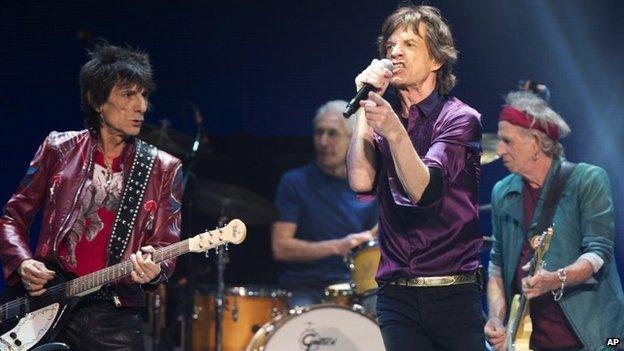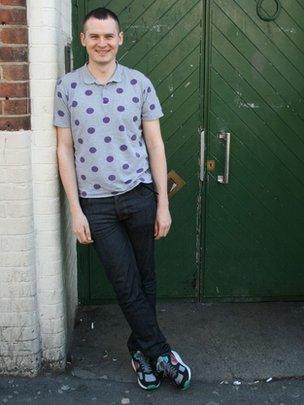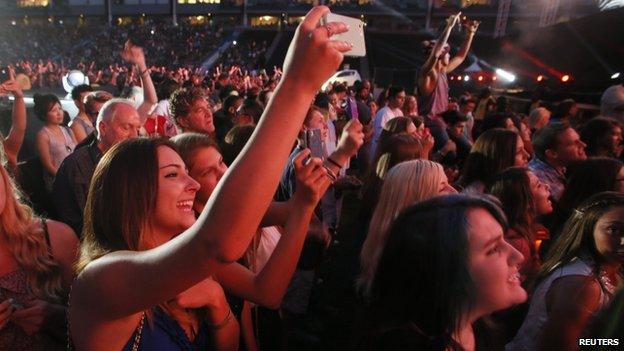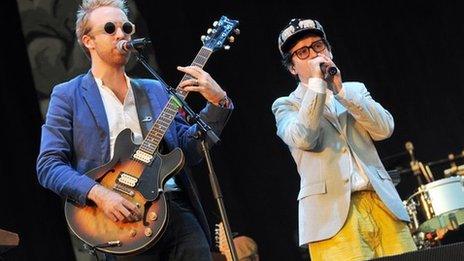Organise a concert by your favourite band
- Published

Ever fancied organising a concert by your favourite band or singer?
The Rolling Stones apparently charge $8m (£5m) to do a one-off performance, while Sir Elton John is said to require $4m.
Kylie Minogue - who once sang at the wedding of the daughter of Indian steel billionaire Lakshmi Mittal - is reported to be a more affordable $2m.
So for those of us without superwealth, arranging such a gig seems impossible.
However, help may now be at hand thanks to three music fans and their London-based company Songkick.
A concert notification website and app for your mobile phone and tablet, Songkick this year launched a new service called Detour.
Essentially a form of crowdfunding, fans who wish to bring a certain band to their hometown or city can start a petition or "pledge" via Songkick.
You enter your credit card details on Songkick's website or app, and how much you would be prepared to pay.
If a sufficiently large number of people also pledge, then Songkick informs the band in question and its promoters.
"We have launched the service in London, targeting smaller bands and venues," says Songkick's co-founder and chief executive Ian Hogarth.
"But we plan to extend it across the UK and globally, and ultimately to the largest venues and artists.
"Obviously there is no guarantee that the band or singer in question will ultimately agree to play in a certain town, but so far more than 90% have indeed done so to - performing live is after all how bands make the majority of their money these days."

Ian Hogarth says he was influenced by his year living and working in Silicon Valley
But if you and your friends are indeed successful in bringing to Rolling Stones to your town, how much do you pay via Songkick?
Ian says: "You ultimately pay the ticket price as set by the band. So if you have pledged more, you don't pay the difference. And if you have pledged less than the ticket price, we contact you to say you'll need to pay more.
"And of course you can pull out of paying if ultimately you don't want to, or can't make the concert for some reason."
So if that is how Songkick's Detour service helps music fans, how does it benefit the bands or solo artists?
Put simply, Songkick passes on vital information to bands about how many people would like to see them play live in a certain place - and the prices they are prepared to pay for tickets.
From this data bands can work out which towns and cities to go to, the correct size for a venue, the optimum number of concerts to play and how much to charge. And Songkick gets a cut of the ticket price.
With an average of 50% of all concert tickets currently going unsold in countries such as the UK and US, Songkick claims the information it provides is the holy grail for the live music industry.
Ian says: "It is about bringing 21st Century technology to the live music industry."
Based in the Hoxton area of east London, the other, and currently larger, part of Songkick's business is a notification system that means music fans can avoid missing out on seeing their favourite band or singer perform live.
Free to use for the consumer, it sends you an alert when a band or singer you like is about to release tickets for a tour due to visit a city or town near you.
You can then buy the tickets via Songkick, which takes a commission of up to 10% from the promoter.

Songkick's main business involves reminding users to buy tickets to see their favourite artists
Songkick's technology means that the user doesn't have to enter a list of bands and singers that he or she likes, as instead it automatically checks your digital music collection, and what you listen to on streaming services such as Spotify.
Ian and his two co-founders started the company when he was just 25. Now six years later, it is a global operation used by eight million people per month.
For Ian, a Londoner who studied engineering and software at Cambridge University, it was working in California's Silicon Valley that made him realise you are never too young to launch a new technology company.
"Living in the Valley for a year was a really influential experience," he says. "The head of data at Facebook at the time was my age. It helped me realise that you could just go for it and start a business if you were interested in solving a particular problem.
"The actual idea came from my co-founder Michelle You, we are both really big gig-goers, and she said, 'Is there a way to use technology to make it easier to know when a band you like is going on tour?'
"I had the tech background to say 'yes it can be done', and Songkick came from there."
Ian says he "always wanted to build something".

London-based band Hot Chip have successfully used the Detour service
"It didn't have to be a company, an invention would have done. I'm always most excited when making something."
But after graduating, Ian's love of music and China initially saw him spend a year in Beijing, learning Mandarin and earning money as a DJ playing hip-hop.
It was also in Beijing that he first met Californian Michelle You, who was a fellow pupil at the same language class.
They both kept in touch when they left China, with Ian working in Silicon Valley for management consultants Bain & Company, and Michelle in New York.
After Michelle questioned how technology could be used to better used to find out about forthcoming concerts, the idea for Songkick was born.
Quitting their day jobs together with third co-founder Pete Smith, a friend of Ian's since Cambridge, they set up the company, initially using their own money.
Ian says that while he and his colleagues could have based Songkick in California, they chose London because: "It is the gig capital of the world. London has more concerts than anywhere else."
He says the company is proud to be doing its bit to help the wider music industry.

Kylie Minogue is one of numerous artists available for one-off concerts
"The music industry has been through a huge amount of change in recent years. Not helped by illegal downloads, sales have fallen sharply.
"So now bands make 70% of their income from touring. But at the same time, on average, half of all concert tickets go unsold. Songkick is helping sell those spare tickets."
Now backed by venture capital funding, including $10m (£6.4m) last year from Sequoia Capital, the Silicon Valley firm that has previously funded the likes of Google, Apple and PayPal, Songkick still has just 30 members of staff.
"We are a small team, but the important thing is the talent density - our staff are extremely talented," says Ian.
And while he says he finds it difficult not to spend all his time thinking about the company, he is happy to delegate.
"I see my job as attracting exceptional people to solve problems, and then getting out of the way to let them do it."
Ian now intends to grow Songkick's business tenfold over the next five years, and is relaxed about the possibility of the established ticket agencies doing something similar to both its core business and new Detour operation.
He says: "Our biggest competitors are the ones you don't know about - the three people in a bedroom coming at it from a completely different angle."